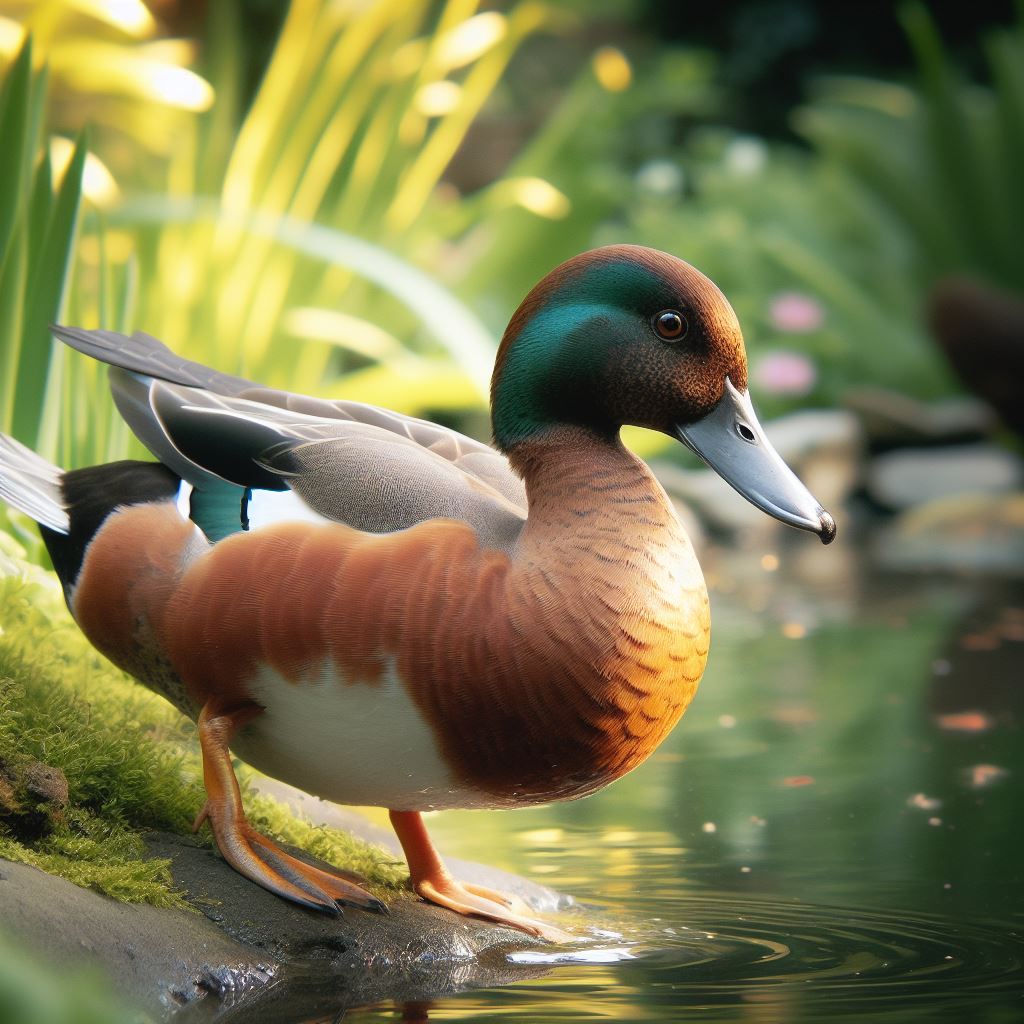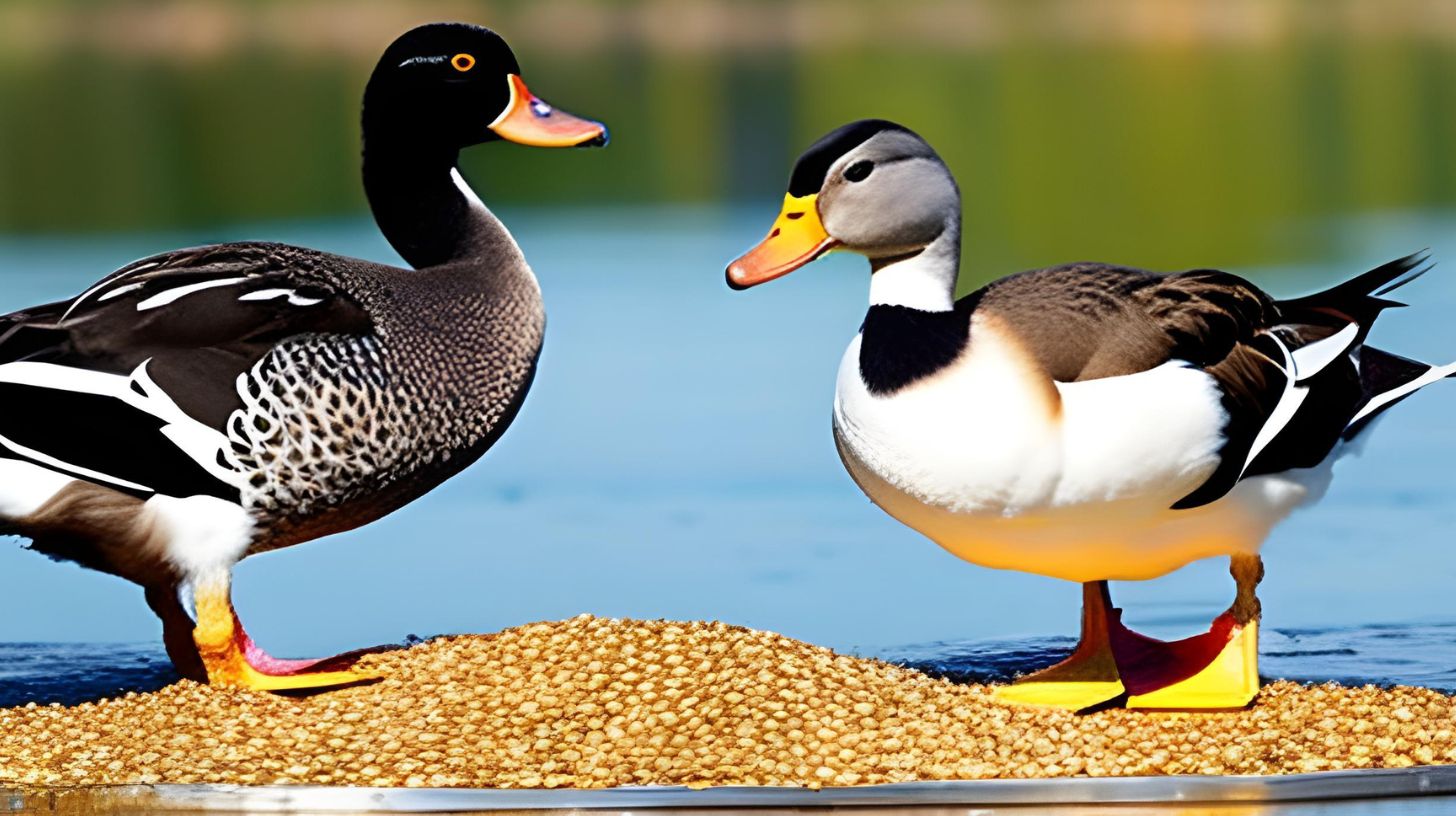Do Ducks Eat Lettuce? Find Out Here

Table of content:
Lettuce is a common vegetable that many people enjoy in salads and on sandwiches. If you have domestic ducks or encounter wild ducks, you may wonder if lettuce should be part of their diet too. The short answer is yes – ducks can and do eat lettuce. However, not all types of lettuce are equal when it comes to providing ducks with nutrition.
Do Wild Ducks Eat Lettuce?
Wild ducks will eat lettuce if they come across it near waterways, ponds or lakes. However, lettuce would be a rare find in most natural duck habitats. The main parts of a wild duck’s diet consist of aquatic plants, grasses, seeds, insects and other water creatures.
If you have a backyard pond that attracts wild ducks, you could offer small amounts of lettuce. But naturally growing greens and plants that wild ducks can forage provide more nutrition. Some good options are watercress, duckweed, water lilies, pondweed or azolla. Introducing too much lettuce could throw off the balance of the pond ecosystem.
Overall lettuce is not a major part of a wild duck’s diet. But they will take advantage of it as an extra source of food if they find it in their environment. Limit any supplementary feeding of lettuce for wild ducks to small portions.
What Kinds of Lettuce Can I Feed Ducks?
Pet ducks, on the other hand, can enjoy a wider variety of lettuce. When choosing lettuce to feed ducks, go for nutrient-dense greens over types that are mostly water. Here are some good options:
Romaine Lettuce
Romaine is one of the most nutritious lettuces, providing vitamins A, B, C and K. It has a decent amount of fiber and more minerals like potassium and iron than other lettuces. Romaine has crunchy leaves and a flavor ducks seem to enjoy. Chop it into bite-sized pieces before serving.
Red or Green Leaf Lettuce
Leaf lettuce varieties like green leaf, red leaf or oak leaf offer more texture and nutrients than iceberg. They contain vitamins A, C, K plus some folate, calcium and iron. Ducks will munch on the whole leaves or pieces of leaf lettuce.
Spring Mix
Packed with spinach, radicchio, arugula and other baby greens, spring mix offers variety. The blend of colors, flavors and textures will appeal to ducks. Spring mix lettuces provide vitamins A, C and K, folate and some minerals.
Endive
Endive has a pleasant bitter taste. The curly, crunchy leaves offer ducks something different from regular lettuce. Endive contains fiber, vitamin A, vitamin K, folate, potassium and antioxidants.
Is Lettuce Good for Pet Ducks?
Lettuce can be part of a balanced diet for pet ducks. It provides some hydration and fiber. Just don’t rely on lettuce as the main food source. Ducks need a variety of foods to get all the nutrients they require. Here are some tips for feeding lettuce to ducks:
- Offer lettuce as a supplement to poultry feed, not as the only food. Ducks need the protein, carbs, vitamins and minerals provided in a commercial duck or poultry feed.
- Limit lettuce to about 15-20% of total food intake. The bulk of their diet should be duck feed.
- Chop or shred lettuce to make it easier to eat. Ducks don’t have teeth to bite off big pieces.
- Switch up lettuce varieties to provide different tastes and nutrients.
- Rinse lettuce well before feeding to remove dirt, chemicals or contaminants.
- Remove any uneaten lettuce within a few hours so it doesn’t rot and make ducks sick.
- Introduce lettuce slowly to young ducklings. Wait until they are eating starter feed well.
A small daily serving of lettuce can give ducks something to nibble on between feedings. It adds interest to their diet. Just be sure lettuce is a side, not the main course.
Can I Feed My Ducks Romaine Lettuce?
Romaine is one of the best choices for feeding ducks lettuce. It has crunchier leaves than varieties like iceberg or butterhead. And its nutrient content is higher, providing more benefits to ducks.
The vitamins, minerals and fiber in romaine lettuce bring more to the table than just hydration. Ducks seem to enjoy the taste and texture too.
To serve romaine lettuce to ducks:
- Rinse leaves and pat dry. Dirty lettuce can make ducks sick.
- Remove any damaged outer leaves.
- Cut or tear lettuce into bite-size pieces.
- Feed romaine lettuce in portions alongside their regular feed. A few leaves per duck is a good amount.
- Remove any uneaten lettuce within a few hours.
Offer romaine as a supplemental treat, not a daily main course. Feed a small serving once or twice a week for variety.
Is Iceberg Lettuce Okay for Ducks to Eat?
Iceberg lettuce is the least nutritious lettuce option for ducks. It is nearly all water and has minimal fiber, nutrients and taste. While a few iceberg pieces once in awhile won’t harm ducks, it offers little health benefit.
The high water content and low nutrition mean iceberg lettuce should comprise only a tiny portion of a duck’s diet. Eating too much could give ducks loose stool without providing meaningful vitamins, minerals or proteins.
If you do feed iceberg lettuce to ducks, limit to a few small shreds no more than 1-2 times per week. Focus instead on tastier, more nutrient-dense greens like romaine, leaf lettuce, endive or spinach.
Should You Give Ducklings Lettuce?
When raising young ducklings, hold off on introducing lettuce and greens for the first few weeks. Here are some guidelines on feeding lettuce to ducklings:
- Wait until ducklings are 2-3 weeks old before offering any lettuce. Their digestive systems need time to develop on a starter feed.
- Start with tiny pieces of romaine or leaf lettuce. Iceberg has little nutritional value for ducklings.
- Mix in lettuce with chick starter feed in a ratio of about 20% lettuce, 80% starter feed.
- Gradually increase portions of chopped lettuce over 2-3 weeks as ducklings grow. By 6 weeks old, they can eat a larger percentage of greens.
- Remove uneaten lettuce within a few hours before it spoils.
- Ensure ducklings always have access to fresh water. Lettuce makes them thirsty.
Lettuce can supplement a duckling’s diet once they’re eating starter feed well. But the bulk of their food intake should still be from an appropriate high protein starter feed to support their growing bodies.
Can Baby Ducks Eat Lettuce Leaves?
Baby ducks under 2-3 weeks of age should not eat whole lettuce leaves. At this young age, they cannot properly digest larger pieces of greens. Wait until ducklings are a few weeks old before offering small shredded lettuce.
Young ducklings have tiny beaks designed for eating crumbles or pellets. They cannot tear off pieces of whole lettuce leaves. Providing leaves too early risks ducklings choking.
Chop or shred lettuce into tiny pieces for ducklings. Then mix in with chick starter feed in a ratio of about 20% greens, 80% feed. As they grow bigger, gradually increase the amount of greens.
By 6 weeks old, ducklings should be able to nibble on torn pieces of lettuce leaves. But be sure any uneaten lettuce is removed within a few hours to prevent mold or bacteria growth. Focus on offering nutritious lettuce like romaine rather than water-filled iceberg.
Final Thoughts
Lettuce can be a healthy supplemental food for ducks when chosen wisely and fed in moderation. Focus on nutrient-dense varieties like romaine, leaf lettuce or spring mix. Avoid too much iceberg since it is mostly water and not very nutritious. Introduce lettuce slowly to young ducklings, after they are eating starter feed well.
While ducks enjoy lettuce for texture and flavor, it should never be their only food. Keep lettuce to 15-20% of total food volume for a balanced diet. Feed nutritious poultry crumbles or pellets as dietary staple along with fresh water. With the right amounts and types of lettuce, your ducks will benefit from added vitamins, minerals and fiber. Just don’t let them fill up on lettuce alone at mealtime!
Welcome. I’m Adreena Shanum, the proud owner of this website, and I am incredibly passionate about animals, especially poultry. I founded adreenapets.com as a labor of love, stemming from my desire to share my knowledge and experiences with poultry enthusiasts worldwide.




